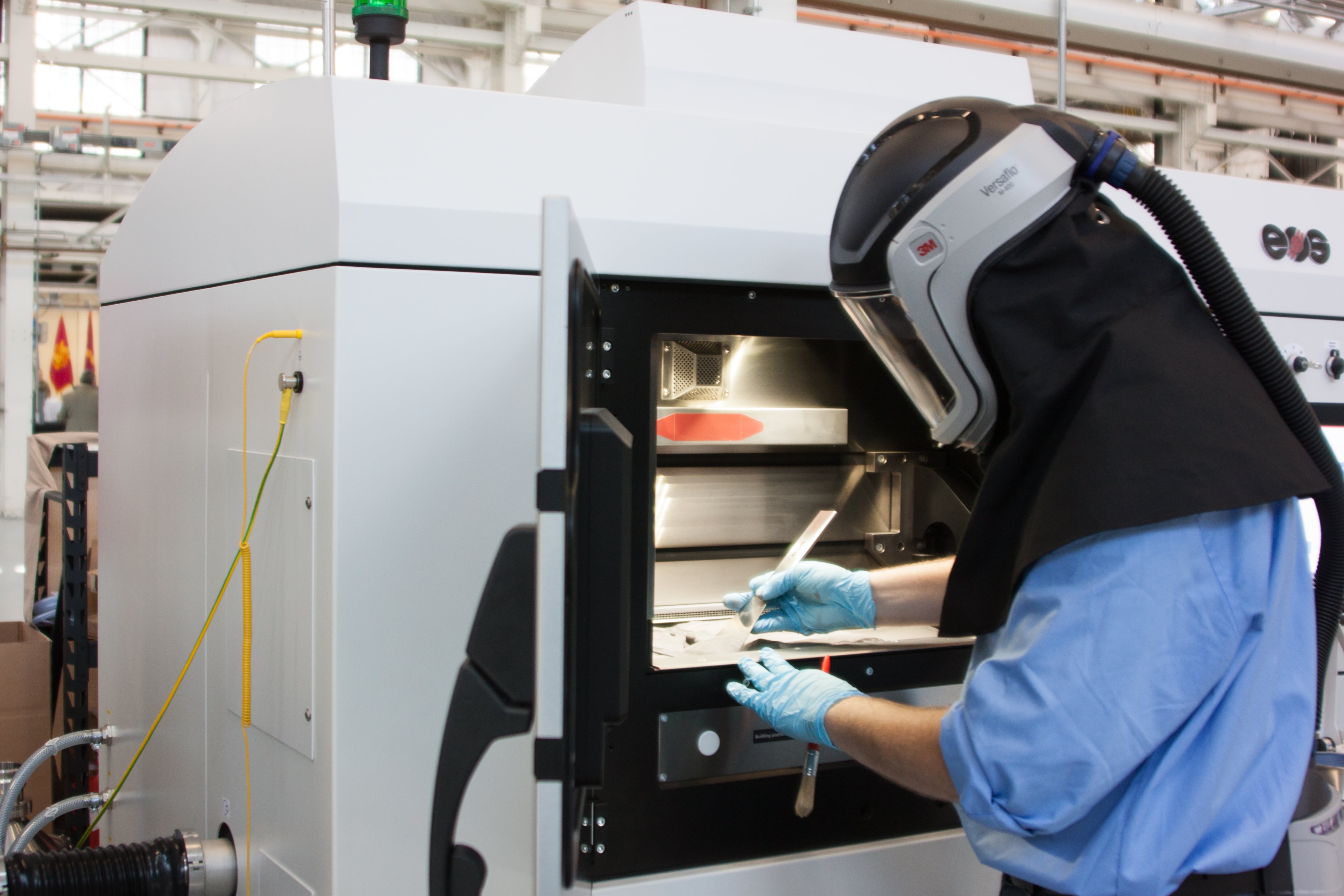The Defense Innovation Unit on Thursday launched a new marketplace designed to connect technology firms with vetted advanced manufacturing companies whose production approaches could bring speed, scale and security to the U.S. defense industrial base.
DIU Director Doug Beck announced the Blue Manufacturing Marketplace last year as a way to overcome some of the barriers to leveraging advanced manufacturing capabilities like digital engineering, 3D printing and automation across the defense industrial base. Now, DIU is accepting proposals from vendors who have specific expertise across six areas, including automated metal machining for parts production, composite or ceramic additive manufacturing and 3D-printed tooling.
Beck told Defense News in an interview Wednesday that this is the first of many solicitations designed to help smaller firms developing cutting-edge, dual-use technology partner with advanced manufacturing firms that can help them scale their products. Rather than award contracts like it might for other programs, DIU’s role through the marketplace is to vet these manufacturing companies to make sure their supply chains are secure and provide a venue for those firms to find one another.
“It’s about creating the marketplace effectively for these folks to find those companies and encouraging them each to find one another in order to do their scaling,” Beck said.
The Pentagon over the last few years has emphasized the need for rapid production and scaling as a means both to replenish depleted weapons stocks and field low-cost systems like throw-away drones en masse. Innovative manufacturing techniques are one way to get after that challenge.
In its 2024 National Defense Industrial Strategy, the Defense Department called for greater adoption of advanced manufacturing and automation throughout the defense industrial base, identifying these technologies as a key enabler for not only increasing capacity but for making production processes more efficient.
“Many elements of the traditional [defense industrial base] have yet to adopt advanced manufacturing technologies, as they struggle to develop business cases for needed capital investment,” DOD said in its report. “This directly impacts DOD’s ability to reduce manufacturing lead times and lifecycle costs and to increase readiness.”
RELATED

Beck emphasized that the Blue Manufacturing Marketplace is just one part of a broader umbrella of DOD efforts to better leverage advanced manufacturing throughout the defense industrial base. However, he said, it has the potential to be a game changer.
“Five years down the road, this might be one of the most important things that DIU helped to make happen,” Beck said.
Travis Demeester, DIU’s lead for the marketplace, told Defense News his team has spent much of the last year talking to manufacturing companies about the roadblocks they face in working with customers in the defense sector and figuring out how the new venue might address them. Many firms cited difficulty in establishing trust and verifying that their supply chains and executive boards aren’t funded by or linked to U.S. adversaries, he told Defense News in an interview. They also pointed to the lengthy vetting process that comes with integrating their capability into another company’s supply chain.
Demeester said DIU already provides vetting for companies entering the defense industrial base and is well positioned to help create a “shortcut” for onboarding manufacturing companies. In fact, the marketplace’s name is a nod to another DIU program, Blue UAS, that helps vet commercial drones for compliance with U.S. policies that restrict DOD from buying uncrewed systems or technology originating from Chinese firms.
DIU’s role in helping create a bridge between commercial firms and the complexities of DOD’s acquisition and procurement processes also means it has mechanisms in place to both onboard new capabilities and identify partnerships between firms with complementary technologies, Demeester said. In the case of the Blue Manufacturing Marketplace, that means connecting tech-focused firms with manufacturing capacity.
RELATED

“The big focus of what we want to do here is make it a lot easier for companies like that to scale,” he said. “And so, by identifying these exceptional manufacturers and making them available to those companies, that’s the approach that we’re taking.”
Today’s rollout is the first of many steps toward building out the marketplace, Demeester noted. Rather than spend years on the front-end defining what it will be, DIU wants industry to inform that process in real-time.
And practically speaking, he noted, DIU doesn’t yet have the resources to fully implement its vision for what the marketplace could become. For now, Demeester’s team is small and agile and doesn’t have a formal budget allocation.
One potential future growth area is in certification and qualification of additive-manufactured parts — a need expressed by the military services as they increasingly look to non-traditional vendors to supply certain capabilities. Demeester said he also expects future solicitations to target manufacturing companies with expertise in particular technology areas, like hypersonics or autonomy or firms that are based in different geographical regions.
“This isn’t a matter of putting all of our chips into the first effort, but in terms of how we resource it, how we grow it, programmatically, etc., we’re going to keep a close eye on it and be agile about that,” Demeester said.
Courtney Albon is C4ISRNET’s space and emerging technology reporter. She has covered the U.S. military since 2012, with a focus on the Air Force and Space Force. She has reported on some of the Defense Department’s most significant acquisition, budget and policy challenges.







